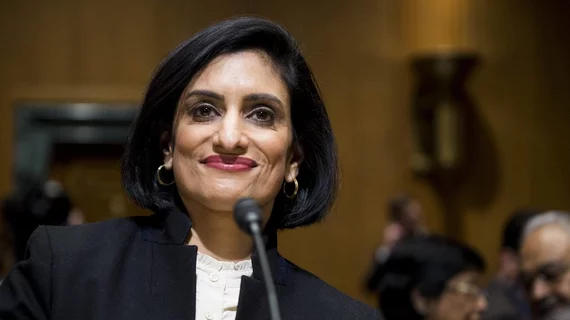25 participants advance in $1M AI challenge
CMS announced Thursday, Oct. 31, that 25 participants have advanced in the agency’s Artificial Intelligence Health Outcomes Challenge, putting them one step closer to earning $1 million in prize money.
CMS said the competition was crucial to implementing the strategy put forth in President Donald Trump’s February 2019 executive order about AI research in the United States. The goal is to accelerate the development of solutions that could help healthcare providers and improve patient outcomes.
“Artificial Intelligence is a vehicle that can help drive our system to value—proven to reduce out-of-pocket costs and improve quality,” CMS Administrator Seema Verma said in a prepared statement. “It holds the potential to revolutionize healthcare: imagine a doctor being able to predict health outcomes—such as a hospital admission—and to intervene before an illness strikes. The participants in our AI Challenge demonstrate that such possibilities will soon be within reach. We congratulate the 25 innovators who have been selected to continue, and we look forward to seeing what else they have in store.”
A team of “data science experts, healthcare data specialists and clinical care providers” helped determine which 25 participants would advance to stage 1 of the competition. In 2020, as many as seven participants will move on to stage 2 and receive $60,000 each. The winner of the challenge will receive $1 million, with the runner-up receiving $230,000.
More information on the Artificial Intelligence Health Outcomes Challenge is available on the CMS website. The 25 advancing participants are listed below:
- Accenture Federal Services
- Ann Arbor Algorithms Inc.
- Booz Allen Hamilton
- ClosedLoop.ai
- Columbia University Department of Biomedical Informatics
- CORMAC
- Deloitte Consulting LLP
- Geisinger
- Health Data Analytics Institute
- HealthEC, LLC
- Hospital of the University of Pennsylvania
- IBM Corporation
- Innovative Decisions Inc.
- Jefferson Health
- KenSci Inc.
- Lightbeam Health Solutions, LLC
- Mathematica Policy Research Inc.
- Mayo Clinic
- Mederrata
- Merck & Co. Inc
- North Carolina State University
- Northrop Grumman Systems Corporation
- Northwestern Medicine
- Observational Health Data Sciences and Informatics
- University of Virginia Health System

